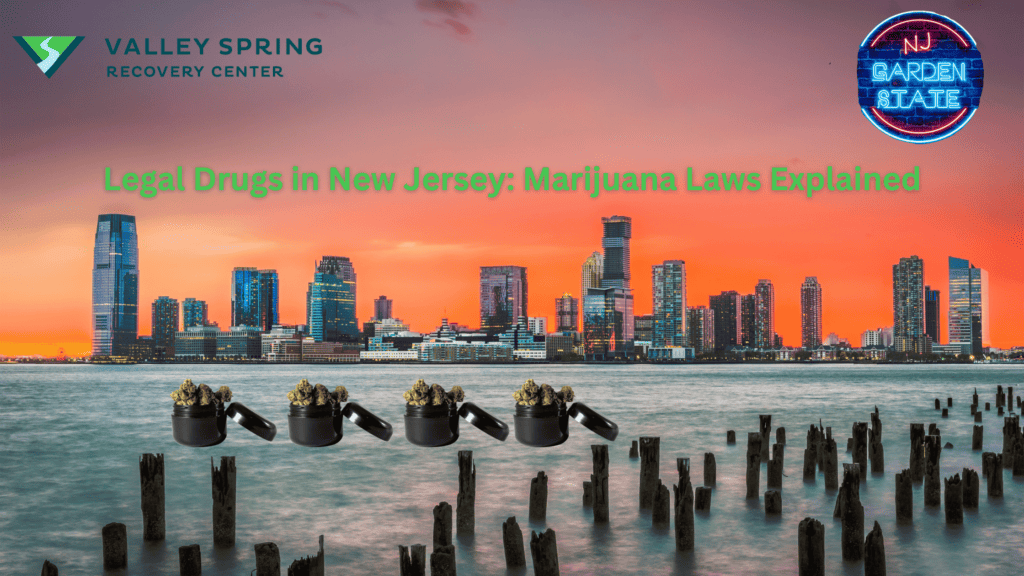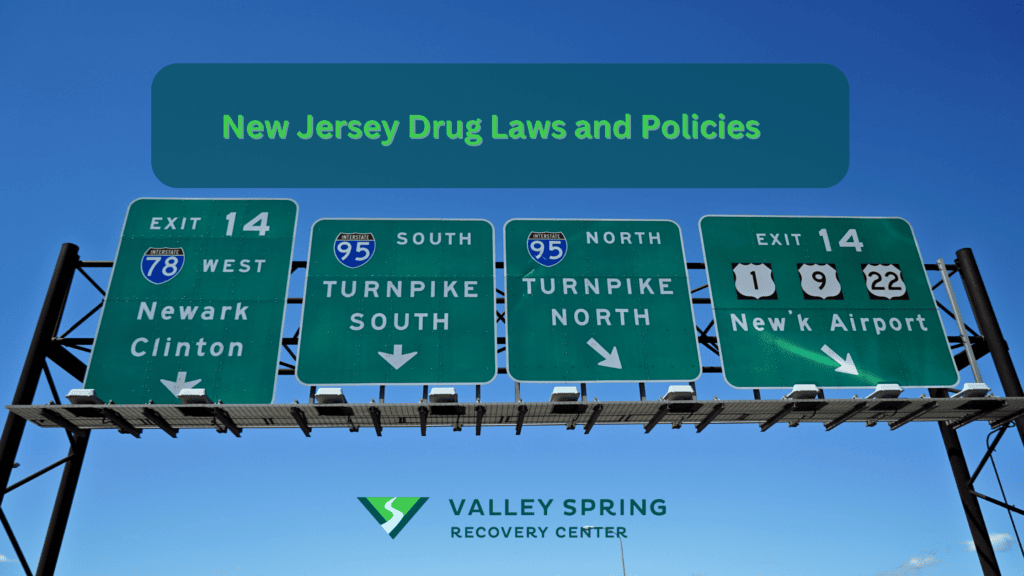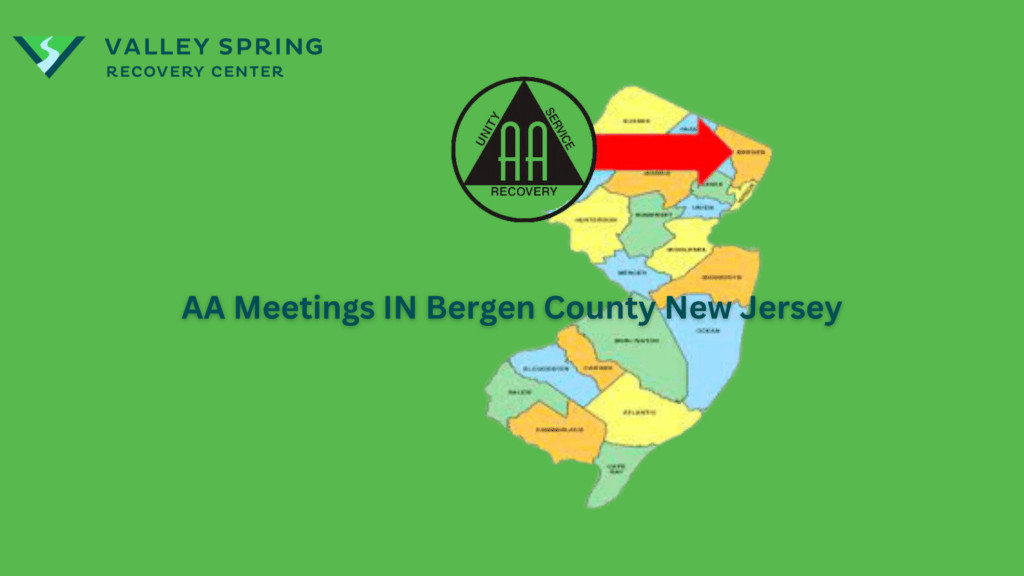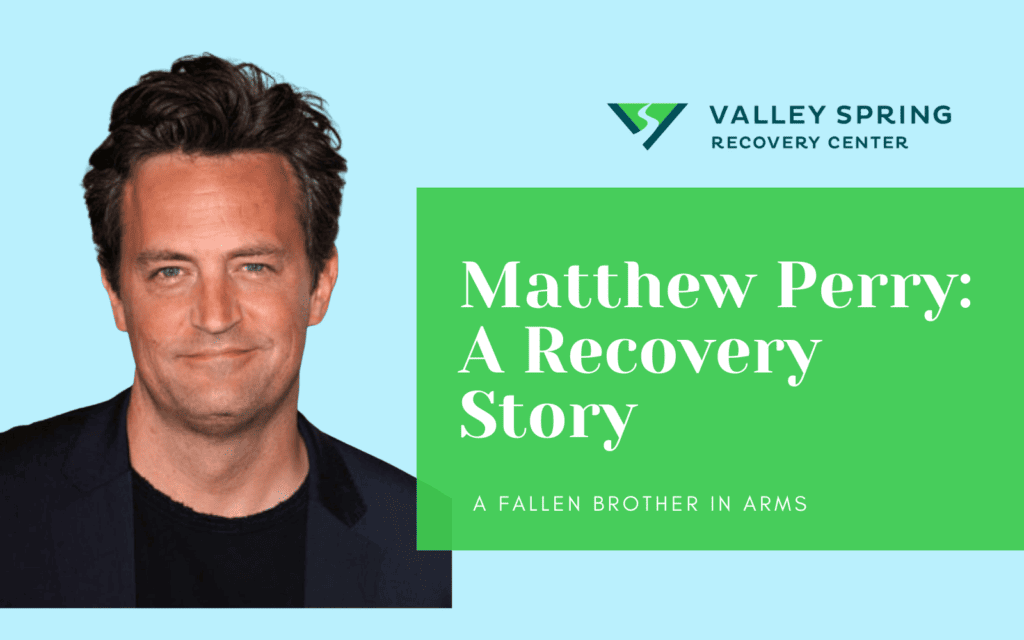Understanding the legal status of marijuana in New Jersey is critical whether you’re a consumer, medical patient, or business owner. New Jersey law permits both recreational and medical marijuana use, governed by comprehensive regulations that address everything from possession limits to commercial sales. Dive into this article to unpack the New Jersey Cannabis Regulatory, Enforcement Assistance, and Marketplace Modernization Act’s impact on legal drugs in New Jersey marijuana.
Key Takeaways
New Jersey has decriminalized and regulated marijuana use through the New Jersey Cannabis Regulatory, Enforcement Assistance, and Marketplace Modernization Act and NJ A21, now allowing regulated medical and recreational cannabis sales.
The Cannabis Regulatory Commission (CRC) oversees New Jersey’s cannabis industry, prioritizing social equity businesses and compliance with state regulations, without the power to enforce laws, permit personal cultivation, or decide on business locations.
New Jersey’s cannabis legislation establishes possession limits, operational medical and recreational dispensaries, and allows municipalities to set local regulations and opt-out of cannabis sales, with penalties for violating state marijuana laws.
New Jersey Marijuana Legislation

In the evolving world of marijuana legislation, New Jersey has carved out its own unique path. Despite the federal classification of marijuana as a Schedule I substance and other drugs as schedule ii controlled substances under the Controlled Substances Act, the state has made significant strides in decriminalizing and regulating the plant’s use. The most significant milestones in this journey are encapsulated in the New Jersey Cannabis Regulatory, Enforcement Assistance, and Marketplace Modernization Act and NJ A21 (legalization and regulation bill), which have effectively reshaped the state’s drug laws and the marijuana landscape.
The enactment of these laws marked a turning point for marijuana availability and control in the state, which had previously grappled with high rates of marijuana abuse. The legislation permitting cannabis sales came into effect on April 21, 2022, providing new avenues for marijuana businesses and offering regulated access for medical cannabis patients and recreational consumers.
What Is The Medical Cannabis Program?
The Medicinal Cannabis Program, also known as the medical marijuana program, plays a pivotal role in New Jersey’s marijuana legislation, acting as a lifeline for patients with qualifying conditions. Under this program, registered patients can receive orders from their doctor for up to 84 grams of cannabis every 30-day period. To ensure the program’s integrity, stringent requirements have been put in place. Patients must maintain a bona fide relationship with a healthcare provider registered with the program, which entails at least one year of relationship, four visits, or a comprehensive medical history and physical examination.
The program covers a broad spectrum of medical conditions, from cancer and PTSD to multiple sclerosis, thus extending its reach to a wide patient population. To further ensure compliance with the state’s cannabis-related laws and regulations, Medicinal Cannabis Program ID cards are mandatory for patients and caregivers.
Is Recreational Cannabis Legal?
In 2020 New Jersey voters approved New Jersey Public Question 1, thereby constitutionalizing the legalization of recreational cannabis for individuals aged 21 and over. This referendum was a testament to the years of persistent efforts to legalize marijuana through the legislature.
The Cannabis Regulatory, Enforcement Assistance, and Marketplace Modernization (CREAMM) Act now serves as the legislative backbone for recreational cannabis use in the state. As of 2021, adults aged 21 and older could legally possess, produce, and sell limited amounts of recreational marijuana for recreational use. This marked a significant change in marijuana laws for many states. Legal recreational cannabis sales commenced on April 21, 2022, with the first set of rules and regulations being established on August 19, 2021.
What Are The Personal Marijuana Use and Possession Limit Laws In New Jersey?

Anyone partaking in cannabis use in New Jersey must understand the personal use and possession limits, as is the case with any regulated substance. For both medical cannabis patients and recreational consumers, the state has specific possession limits. These restrictions not only ensure legal compliance but also contribute to larger public health and safety objectives.
What Are the Medical Cannabis Laws In New Jersey?
Medical cannabis patients in New Jersey are subject to specific possession limits allowing medical marijuana patients to purchase up to 85 grams for a 30-day period, with special exemptions for terminally ill patients who may require larger amounts prescribed by their physicians. Patients can purchase any combination of the following within their monthly allowance:
Flower
Concentrates
Oil
Ingestibles
Registered patients can also designate up to two caregivers to assist with obtaining medical cannabis and have the privilege to consume their medicinal cannabis anywhere smoking is permitted, barring areas restricted by the Smoke Free Air Act.
What Are The Recreational Marijuana Laws For New Jersey?
The recreational marijuana usage laws in New Jersey allow adults to legally possess up to 6 ounces of marijuana or 17 grams of hashish. Recreational marijuana users are allowed to purchase up to 1 ounce of marijuana per transaction. However, recreational cannabis smoking is restricted to spaces where tobacco smoking is allowed, in adherence to the New Jersey Smoke-Free Air Act, and is prohibited in any area where tobacco smoking is forbidden, including indoor public areas and workplaces.
Additionally, stringent prohibitions are in place against the sale of recreational cannabis to minors.
What Is The Cannabis Regulatory Commission (CRC)

The Cannabis Regulatory Commission (CRC) stands as the cornerstone of cannabis legislation and regulation in New Jersey. Launched on April 12, 2021, the CRC is tasked with overseeing both the medicinal and adult-use recreational cannabis programs in the state. The commission’s central roles include establishing rules and regulations for sales and overseeing the medicinal cannabis program. However, while the CRC plays an instrumental role in shaping the state’s cannabis landscape, its mandate does not extend to law enforcement, deciding cannabis business locations, permitting personal cultivation, or overriding existing statutes.
In addition, the CRC reviews license applications, grants business licenses, and monitors social equity compliance, reflecting the state’s dedication to nurturing a diverse and inclusive cannabis industry.
How Has Licensing and Regulation Changed In New Jersey?
Significant changes in licensing and regulation have characterized New Jersey’s path towards a regulated cannabis industry. The Cannabis Regulatory Commission issues licenses for both medicinal and recreational cannabis business operations in the state, with priority given to Social Equity Businesses, diverse-owned businesses, and Impact Zone Businesses. Recognizing the potential hurdles faced by aspiring cannabis entrepreneurs, New Jersey offers a conditional licensing program. This program provides applicants with 120 days to secure a location, gain municipal approval, and convert to an annual license.
Additionally, the CRC has updated its fee schedule for cannabis business applications and certifications as of March 6, 2023, reflecting the evolving nature of the industry.
Ensuring Compliance
The CRC also assumes a vital role in assuring compliance as part of its mission to regulate the rapidly growing cannabis industry. The commission establishes and enforces rules and regulations governing:
Licensing
Cultivation
Testing
Selling
Purchasing of cannabis in the state.
One of the critical areas of compliance with federal law is the prohibition of selling recreational cannabis, a controlled substance, to individuals under the age of 21.
How Does The Cannabis Business Landscape in New Jersey Work?

New Jersey’s cannabis business landscape mirrors the dynamism of its legislation. With a mix of small local and larger businesses, the state’s cannabis industry is a vibrant ecosystem of over 200 operating licenses, including 23 cultivators and 15 manufacturers. The state awards both microbusiness and standard business licenses, providing ample opportunities for entrepreneurs of all sizes to participate in the industry.
With no established state-wide limit on the number of cannabis business licenses, the potential for market growth is significant.
How many Medical Dispensaries are there in New Jersey?
New Jersey has 14 medical marijuana dispensaries that exclusively cater to patients with qualifying conditions to have access to the cannabis products they need. Jeff Brown, the executive director of the New Jersey Cannabis Regulatory Commission, said that they have issued 40,000 patient cards and 2,736 caregiver cards in the 2023 fiscal year.
How Many recreational Cannabis dispensaries are there in New Jersey and How much marijuana do they sell?
The recreational sector of the cannabis industry has also seen significant growth with 30 stores serving both medical patients and recreational consumers, and 14 medical-only dispensaries. Six medical stores that have delivery options available for medicinal marijuana patients. As of 2023, 30 recreational cannabis dispensaries reached a staggering $673,907,755, outpacing medicinal cannabis sales and signaling a strong growth trajectory for the industry.
Municipal Authority and Local Regulations
Although state laws and regulations provide a broad framework for marijuana legislation in New Jersey, local authorities also exercise substantial influence in shaping the cannabis landscape. Municipalities in the state have the authority to establish their own regulations and zoning ordinances for cannabis businesses, allowing for a degree of local control over the industry.
Zoning and Restrictions
Zoning laws and restrictions play a crucial role in determining where cannabis businesses can operate. These rules are established by local municipalities and include requirements for business locations and compliance with local ordinances.
Opting Out of Cannabis Sales
In addition to setting zoning laws and restrictions, municipalities in New Jersey also have the option to opt-out of cannabis sales. This provision allows local authorities to ban cannabis businesses from operating within their jurisdiction, with specific deadlines and conditions.
However, municipalities that opt-out can later opt-in and allow businesses, providing a degree of flexibility in local cannabis regulations.
Penalties for Violating New Jersey Marijuana Laws

Even with the progress made in marijuana legalization, it’s vital to bear in mind that violations of New Jersey’s marijuana laws carry penalties. These penalties vary depending on the offense and can range from fines to imprisonment.
Understanding these penalties can help ensure compliance with the law and avoid unnecessary legal complications.
Possession Offenses
In New Jersey, marijuana possession offenses vary based on the amount of marijuana involved. Possession of more than 6 ounces of marijuana or more than 17 grams of hashish for personal use is considered a fourth-degree drug-related crime in New Jersey, punishable by up to 18 months in prison and a fine of up to $25,000.
Furthermore, special underage laws apply to individuals under 21, including:
written warnings
notifications to parents or guardians
referrals to community service if caught possessing or using marijuana or hashish in a public place.
Distribution and Cultivation Offenses
Distribution and cultivation offenses also carry penalties based on the amount of marijuana involved. These penalties range from imprisonment and fines for distributing less than one ounce to more severe penalties for distributing large quantities or cultivating 50 or more plants.
In addition, enhanced penalties apply for distributing marijuana within 1000 feet of a school or school bus, as well as for distributing marijuana to minors or pregnant women.
Drugged Driving and Workplace Policies
Similar to alcohol, driving under the influence of marijuana in New Jersey is strictly forbidden. Similarly, employers in the state have the right to maintain a drug and alcohol-free work environment, irrespective of the legalization of cannabis.
DUI Laws
New Jersey’s DUI laws are unequivocal when it comes to cannabis use. The state’s statutes explicitly list marijuana among the intoxicants that can lead to a DUI charge, regardless of whether it’s used for medical or recreational purposes.
Moreover, recreational cannabis use, which falls under the category of illegal drugs, is illegal in vehicles, whether they are in motion or not, and possessing drug paraphernalia associated with its consumption is also prohibited.
Employer Rights and Responsibilities
In the workplace, employers in New Jersey have broad rights when it comes to maintaining a drug-free environment. They are not required to tolerate the use or possession of recreational cannabis in the workplace and can conduct drug tests or assess employees for impairment while at work. However, employers cannot rely solely on general cannabis use for hiring or firing decisions, ensuring a degree of protection for cannabis users.
Social Equity and Community Impact
New Jersey has not only regulated cannabis use and supported the growth of the cannabis industry, but has also made significant progress in promoting social equity and community impact. The state’s Cannabis Regulatory, Enforcement Assistance, and Marketplace Modernization Act allows for the establishment of local initiatives aimed at promoting equity in the cannabis industry.
Additionally, New Jersey has implemented a first-time offenders program that provides education and treatment to prevent future drug offenses, including those involving prescription drugs and substance abuse.
Microbusiness Designation
An integral part of New Jersey’s commitment to social equity is the microbusiness designation. These are small-scale entities with no more than 10 employees and a facility of up to 2,500 square feet, and restrictions on the volume of cannabis that can be handled monthly. Microbusinesses enjoy reduced application fees, and priority in licensing processing, and must comply with two-year state residency for owners and local residency for over half of its employees.
At least 10% of each license class and 25% of all issued licenses are reserved for micro businesses, providing ample opportunities for small-scale entrepreneurs to participate in the state’s cannabis industry.
Social Equity Excise Fee
To further support social equity initiatives, New Jersey has instituted the Social Equity Excise Fee (SEEF). This fee, which currently stands at $1.24 per ounce of cannabis, is applied to transactions involving Class 1 Cannabis Cultivator license holders. The SEEF supports initiatives in Impact Zones, which include educational support, economic development, and social support services.
The collection of the SEEF contributes to the state budget, demonstrating the state’s commitment to utilizing cannabis legalization for public fiscal benefits, while also acknowledging the role of the federal government in regulating the industry.
What class of drug is marijuana in New Jersey?
In New Jersey, marijuana is classified as a Schedule I controlled substance, subject to strict federal regulation. Therefore, its use is closely monitored by federal authorities.
Do you need a prescription for marijuana in NJ?
Yes, you need a prescription for marijuana in New Jersey, as recreational use is legal but having a medical card provides access to more regulated and potent cannabis from medical-only dispensaries.
Does NY have dispensaries for recreational use?
Yes, New York has dispensaries for recreational use of marijuana after becoming the 15th state to legalize it in 2021. The rollout of dispensaries took time, but they are now available.
What is the 1 to 3 act for marijuana?
The Department of Health and Human Services recommended to the DEA that marijuana be rescheduled from Schedule I to Schedule III under the Controlled Substances Act. This is by the Marijuana 1-to-3 Act.
What is the maximum amount of cannabis a medical patient can purchase in New Jersey?
In New Jersey, a registered medical patient can purchase up to 85 grams of cannabis for 30 days, with special exemptions for terminally ill patients.
Are New Jersey Towns Pushing Back Against The Law?
Mahwah, Carlstadt, Garfield, Hasbrouck Heights, and Wood Ridge, in Bergen County, New Jersey have passed ordinances to ban the sale of Marijuana. These towns have put zoning restrictions on dispensaries, along with or other regulations concerning cannabis. It reflects a broader trend of local governments taking steps to address and adapt to changes in state laws regarding marijuana.
How bad is the New Jersey Drug Addiction Problem?
New Jersey faces a severe drug addiction crisis, particularly with opioids and heroin. The state’s overdose death rate is a pressing concern, prompting government and healthcare providers to increase access to treatment programs and preventive measures, aiming to address and mitigate the impact of addiction within communities.
How do New Jersey Drug Laws work for illegal drugs?
New Jersey drug laws categorize illegal drugs into schedules based on their potential for abuse. Penalties depend on the drug type, quantity, and whether the charge is for possession or distribution. Harsher penalties are imposed for higher schedule drugs and larger quantities, with specific provisions for proximity to schools or parks.
Do the New Jersey drug laws change for hashish?
Yes, New Jersey drug laws distinguish hashish from other cannabis products. While recent legislation may adjust penalties for cannabis, hashish possession and distribution still incur legal consequences, which are outlined distinctly from other forms of marijuana, reflecting its concentrated form.
Get Help For Marijuana Addiction
Struggling with marijuana addiction in Bergen County, New Jersey? You’re not alone, and help is closer than you think. There are AA and NA meetings available on our blog as well as government resources. Additionally, at Valley Spring Recovery Center, offers compassionate, comprehensive care around the clock. Available 24/7, our dedicated team is here to guide you through every step of the way towards a healthier, substance-free life. Don’t let addiction control your life any longer. Reach out to Valley Spring Recovery Center now and take the first step towards a new beginning. Your path to recovery starts here.
Ben Fisher
All author postsShare This Post







